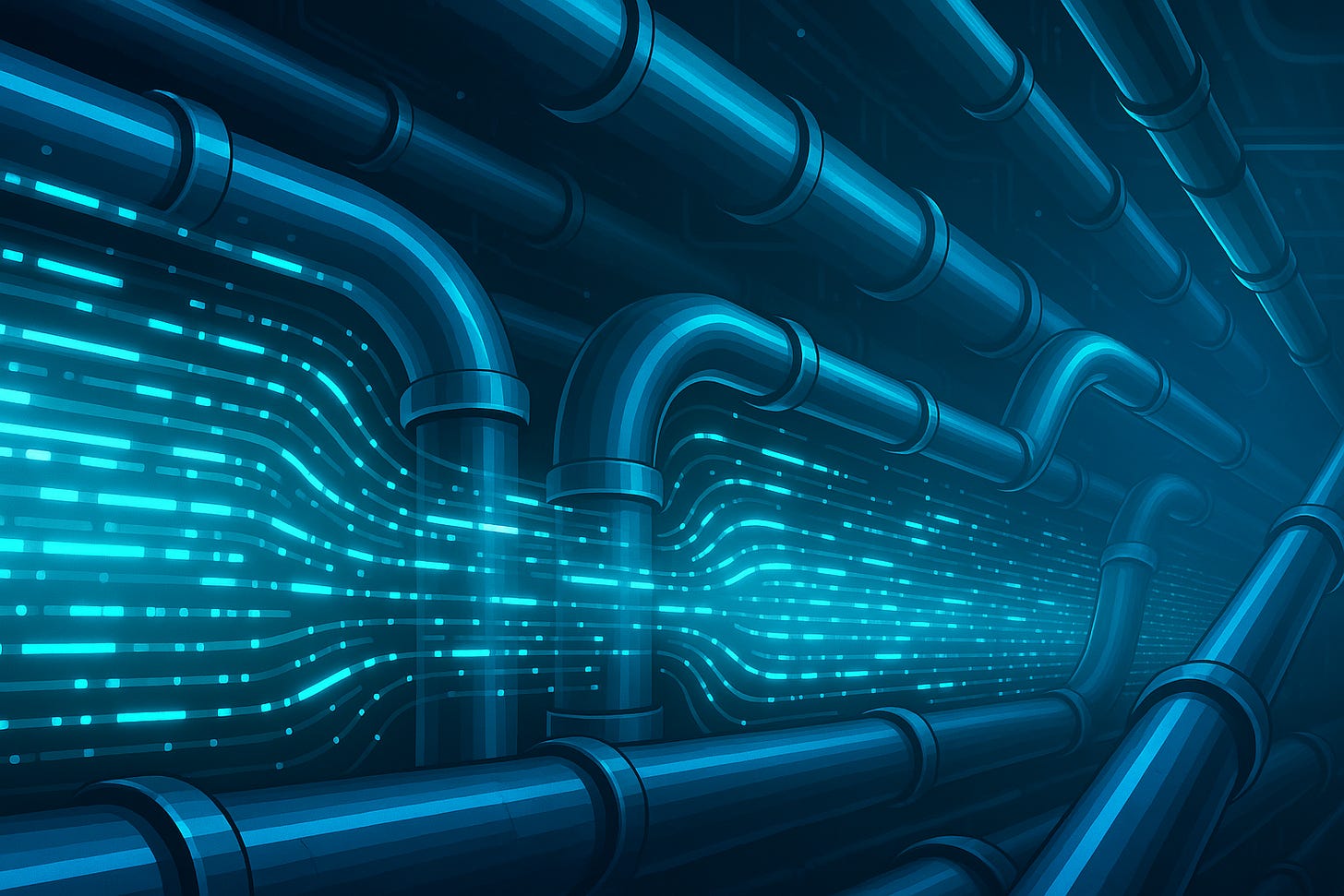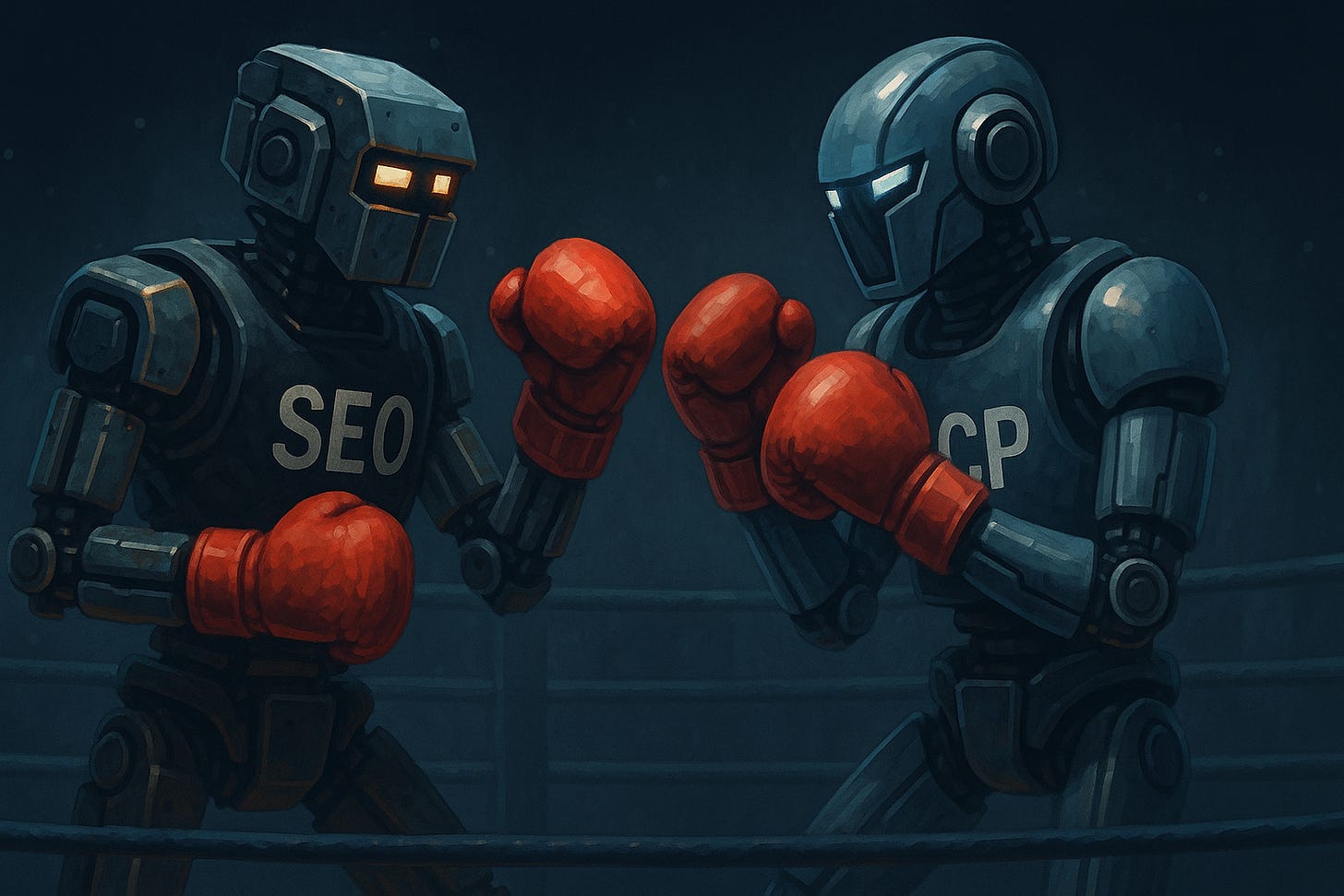The web is being rewired while you're not looking
How AI and new protocols like MCP are quietly reshaping how we find and control information online.
A fundamental shift is underway in how the internet operates, and most people have yet to notice. While you've been asking ChatGPT about dinner recipes or wondering if AI will replace Google, tech companies have quietly been rebuilding the plumbing that connects websites to search results — and that's going to impact both how you find information and how creators or publishers make a living online.
At the center of this change is something called the Model Context Protocol (MCP). Whether it succeeds or fails, MCP represents a massive shift in how information flows across the web. Microsoft’s CTO, Kevin Scott, talked about MCP on Decoder recently, and I’ve been thinking a lot about it ever since.
This isn't just about better search results. It's about who controls the flow of information from websites to your screen and how that control gets shared between tech giants, website owners, and you.
For content creators, small businesses, and publishers, this shift could upend decades of SEO strategies and online marketing approaches. Suddenly, the old ways of chasing keywords and backlinks won't cut it. They'll need to rethink how to present their content in ways that AI systems can understand and share — or risk being left invisible in this new AI-driven ecosystem.
To put it simply...
Think of today's internet like a giant library, and your search engine as the librarian. When you ask a question, the librarian runs around, finds relevant books, and shows you snippets from different pages. Then, you decide which books to actually read.
MCP is like installing a whole new system where, instead of one librarian running around gathering stacks of books for you, you have an AI assistant who can walk up to specific books and ask tailored questions.
The books, in this case websites, get to decide precisely what information to share with the assistant and how to share it. This means the assistant gathers better answers, the books keep control of their content, and you get a more personalized experience.
MCP was created by Anthropic and has been rapidly adopted by OpenAI, Google, and Microsoft. That means your favorite AI assistants — like ChatGPT, Claude, or Gemini — are starting to interact with websites in this new way.
So, instead of getting ten blue links when you search for "best pizza near me," you might get a recommendation tailored to your dietary needs, real-time wait times, and even a reservation — all through a single AI conversation.
The old system is broken (and everyone knows)
The current approach to AI search has created a mess. Publishers are losing billions in ad revenue as AI systems summarize their content without sending traffic back to their sites. Meanwhile, AI companies like Perplexity have even been accused of scraping content without permission to generate answers.
Here's the problem: When an AI pulls a recipe from a cooking website to answer your question, it might give you the full recipe, but you never actually visit the original site. The website owner spent time and money creating that content but gets no benefit, while the AI company reaps the rewards.
Some publishers have secured licensing deals worth millions with AI companies, but those deals cover only a tiny fraction of the content AI systems use daily.
This all means that the websites you rely on for trustworthy information may start charging paywalls or disappear altogether if they can't find sustainable business models in an AI-driven world.
MCP could be a solution (with strings attached)
MCP tries to fix this by giving websites control over how AI systems access their content. Instead of letting AI companies scrape whatever they want, websites can build direct connections specifying what data AI can use and under what terms.
Early adopters like Block and Apollo have integrated MCP, and companies like Replit and Sourcegraph are building it into their platforms. However, as noted by Madrona, while the number of MCP servers is skyrocketing, actual usage remains concentrated, highlighting the ecosystem's early stage and the work ahead to address challenges like security and service integration.
Here's how it works: A news site could let AI assistants access headlines and first paragraphs for free but require you to visit for full articles. A recipe site might share ingredients but keep full instructions on their site. An e-commerce store can use AI to check prices but redirect you to make purchases.
In short, AI assistants get smarter because they can pull real-time info straight from websites, while websites maintain some control over how their content is used.
Like it or not, the SEO game is completely changing
For website owners, this is the most significant shift in online marketing since Google's rise. Traditional SEO, which is optimized for Google's algorithms, is being replaced by a new challenge altogether.
Instead of stuffing blog posts with keywords and chasing backlinks, site owners now must think about how AI agents will understand and interact with their content. That means writing clear, structured, and factual content that AI can easily parse and extract.
For example:
Old way: Write a blog titled "10 Best Coffee Makers Under $100," loaded with keywords, hoping to rank high on Google.
New way: Publish structured data that lets AI answer questions like "What's the best coffee maker for someone who drinks two cups a day and has a small kitchen?" by pulling precise info from your site.
Many publishers are realizing this shift could actually improve content quality. Instead of chasing search rankings with fluff and clickbait, they need to focus on genuinely helpful, clear content. This could mean a significant improvement in the quality of information available online.
For the average internet user, the SEO-driven nonsense that clutters search results today might give way to clearer, more useful answers designed to truly help you.
How search engines are trying to course correct
Google (and other search engines) isn't standing still. Its AI-powered Search already synthesizes info from multiple sources and presents direct answers but in a way that keeps Google in control.
Google's AI reads websites, creates summaries, and decides what information you see. Meanwhile, MCP flips this by giving websites more say over what AI can access.
Think of it like this: Google's AI search is a research assistant who reads everything and summarizes it for you. MCP is like having direct phone lines to experts who answer your questions in real-time.
Depending on whether you use Google's AI, ChatGPT, Claude, or other assistants, you'll see different answers because each builds unique relationships with websites.
The stakes are higher than they appear
This isn't just about better search results, it's about the very architecture of information online. We're moving from a web you explore yourself to one mediated more and more by AI assistants.
But while open standards typically encourage innovation, competition, and collaboration because they can be implemented by anyone, thereby lowering barriers for new entrants and fostering a healthier ecosystem, some experts raise concerns that MCP could introduce new security vulnerabilities or concentrate power in a handful of AI companies.
Also, adoption alone doesn't guarantee fair data access or equitable economics. A handful of large cloud providers might dominate the MCP infrastructure, limiting true decentralization.
Plus, governance matters. Who decides how the protocol evolves? Who controls certification, security standards, or the "rules of the road"? If those are controlled by a few companies, it might still feel closed in practice.
The benefits are real, though, including personalized info, AI that can help with complex tasks, and the potential for fairer creator compensation. However, the risks are real as well: reduced direct site exploration, growing dependence on AI intermediaries, and smaller sites falling behind if they can't implement MCP.
Either way, a change is coming and your internet experience will become more assistant-driven and less about browsing, whether you want it to or not.
Nobody knows who will win (hopefully us all?)
The rapid adoption of MCP by big AI companies makes it likely to become a standard. However, standards can fail for reasons beyond technology, including market dynamics, politics, or new innovations.
Maybe MCP becomes like USB-C — a universal connector that makes everything better. Maybe Google's AI Search evolves to offer the same benefits without forcing sites to adopt new systems. Perhaps a completely new approach renders both obsolete.
What's certain is the web you use in five years will be fundamentally different. This fight isn't just about who wins, it's about whether the internet becomes more useful and fair, or just more controlled by tech giants.
This rewiring is already underway in developer documentation and conferences, which most people never see. But its effects will soon show up in how you find information, how websites make money, and how much control you have over your digital experience.
The web you know today is quietly fading, replaced by an AI-driven future that promises smarter answers but raises challenging questions about control, fairness, and digital freedom. The most significant changes are happening now, and how they unfold will shape the internet — and your experience of it — for decades to come.
Whether you're a creator, a business, or simply a curious user, now is the time to pay attention. The AI-driven web is coming fast, and those who understand its rules first will have the greatest influence over its future.







